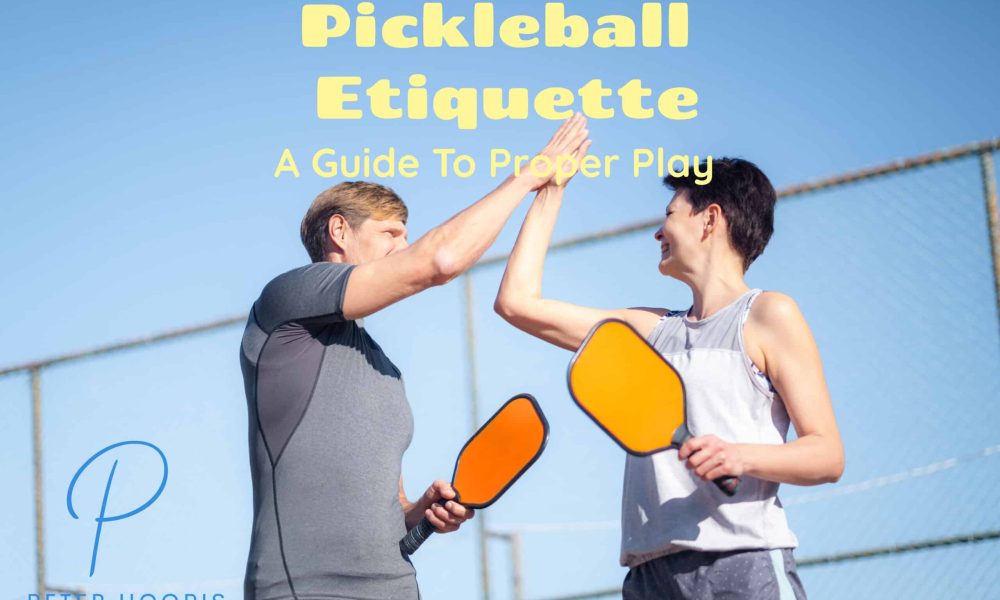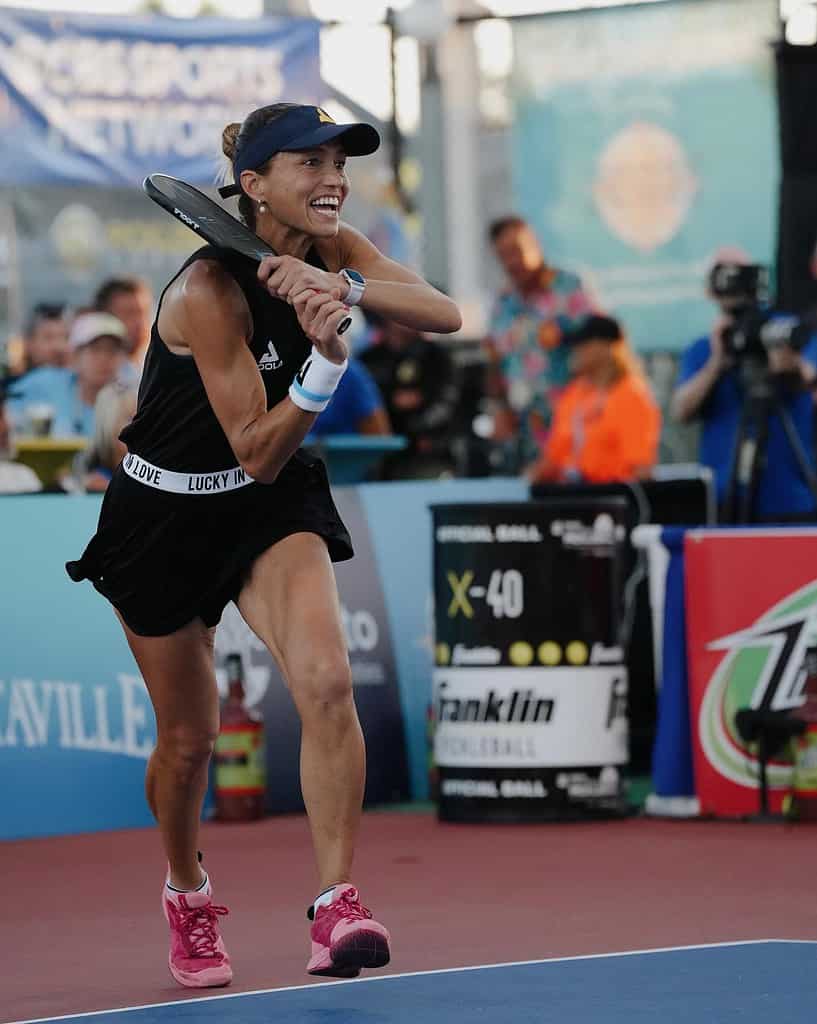Pickleball’s popularity, as we know, is skyrocketing. And as more and more people join the game, it’s important to embrace proper pickleball etiquette. From recreational play to tournament settings, mastering pickleball court etiquette ensures a positive and enjoyable experience for all.
In this blog post, we will cover everything from the unwritten rules to sportsmanship and beyond.
So, let’s dive in so we can make the pickleball court a welcoming place for everyone, as we learn and follow the best pickleball etiquette!
Short Summary
- Respect, inclusive & fair play, and proper court communication create a positive pickleball environment.
- Paddle placement, court sharing/time management, and crossing the court respectfully are key etiquette rules to follow.
- Sportsmanship & positivity through celebrating mindfully, owning mistakes & encouraging others is essential for an enjoyable game of pickleball!
Understanding Pickleball Etiquette: The Unwritten Rules
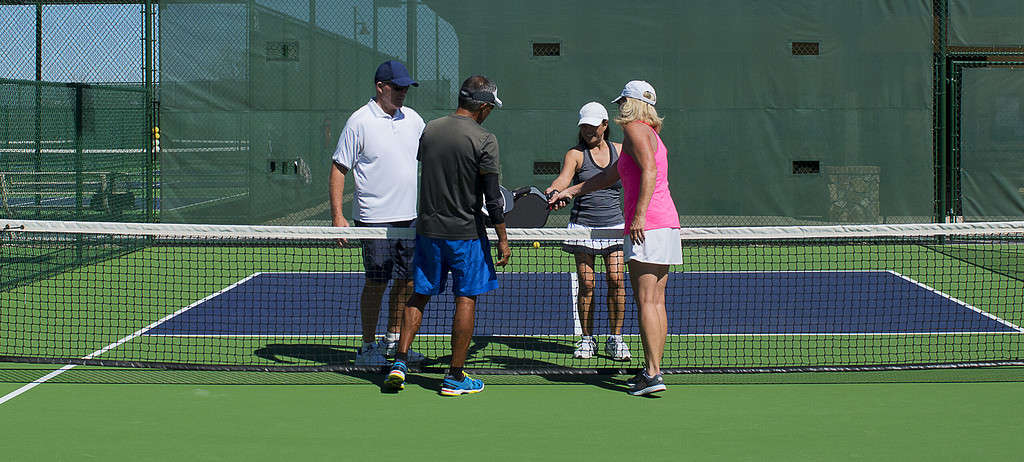
While there are pickleball rules governing the game, there is also an unwritten code of conduct that players should be aware of and abide by. Having proper etiquette not only keeps the game fun and enjoyable but also fosters a positive atmosphere on the court.
So what sets pickleball apart from other sports like tennis and padel and why is it growing at such a rapid pace?
For one thing, it’s the social aspect of the game that is so crucial for creating a fun environment that’s enjoyed by all, including the opposing team.
At the heart of pickleball etiquette is respect for other players. Having a clear understanding of the unwritten rules makes it easier to keep this game that we love so much fun, fair and enjoyable.
This sport brings together people of varying skill levels, ages, and backgrounds, so being able to master these unwritten rules is really helpful for a smooth and enjoyable experience.
But remember this, it’s only a game, and the ultimate goal is to have fun while being fair and respectful to all players. From respecting others to being inclusive of all participants, pickleball is about creating a great shared experience rather than just winning at all costs!
As we dive deeper into the intricacies of pickleball etiquette, you’ll find that humility, sportsmanship, and adaptability are the cornerstones of this beloved sport.
Ball Handling
Stray balls can be a source of frustration and potential injuries on the pickleball court. Therefore, we need to return them quickly and safely to keep the game flowing. Time on court is important these days with the amount of players wanting to play. If a ball from another court rolls into yours, return it promptly when you are able to, avoiding any unnecessary delays or disruptions if you can.
Calling out for stray balls is equally important to prevent injuries and maintain a safe playing environment. Try not to interrupt the game next to you by doing so, but it is a nice gesture to give them a heads up of a stray ball in their court. By being mindful of a stray ball and ensuring its prompt return, you’ll contribute to a smoother and more enjoyable experience for waiting players and those currently on the court.
Inclusive and Fair Play
Pickleball is a sport that embraces diversity and inclusivity, welcoming pickleball players of all abilities, ages, and genders. It’s a great gesture to be open to playing with everyone, regardless of their skill level, and use each game as an opportunity to practice different shots like the difficult to master third shot drop. This inclusive and fair play approach fosters a friendly game environment where everyone can enjoy the sport and improve their skills.
In cases where someone has physical limitations, it’s important to be considerate and not take advantage of their situation. Giving the benefit of the doubt to your opponents in uncertain situations is also part of promoting fair play on the court.
For newcomers eager to play with more experienced players, don’t be shy to approach them and strike up a conversation during open play. This not only helps you build connections within the pickleball community but also opens up opportunities for learning and growth.
Proper Court Communication
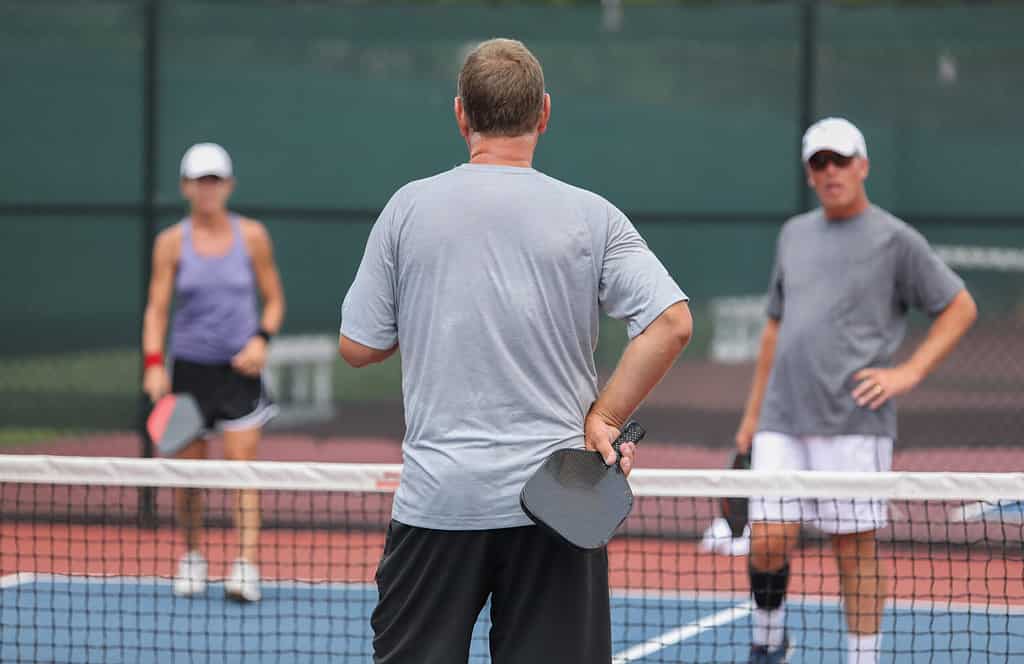
Clear and timely communication is important for maintaining good pickleball court etiquette, as it is in life in general! This includes signaling line calls promptly and distinctly, as well as thanking the referee at the end of the game if you had one. When the opposing team makes an impressive shot, be sure to give props to your opponent as a sign of good sportsmanship.
In addition to these gestures, it’s really helpful to use clear communication with your partner and the other team when switching sides.
By fostering a positive and respectful atmosphere on the court through proper communication, you’ll contribute to a more enjoyable experience for all players involved.
Paddle and Court Courtesy
Proper paddle and court courtesy go hand in hand with good pickleball etiquette. Being aware of other courts and players around you, as well as showing respect for the playing surface, is key for an enjoyable game.
Court sharing and time management are also vital aspects of pickleball etiquette, especially during tournament play and busy recreational play. By taking turns, letting other players join in, and respecting the time limits set by the court, you’ll create a fair and fun environment for everyone to enjoy the game.
In the following subsections, we’ll go deeper into the specifics of paddle placement, labeling, and court sharing.
Paddle Placement and Labeling
Placing your paddle in designated areas like a rack and labeling it with your name or initials is a simple part of pickleball court etiquette during rec play. Doing this helps prevent confusion and ensures everyone knows whose turn it is next on the court.
When labeling your paddle, it’s nice to place the label on the grip or jewel of the paddle, not the face or edge guard. This way, you’ll maintain the paddle’s integrity and avoid any potential disputes over paddle ownership during the game.
Court Sharing and Time Management
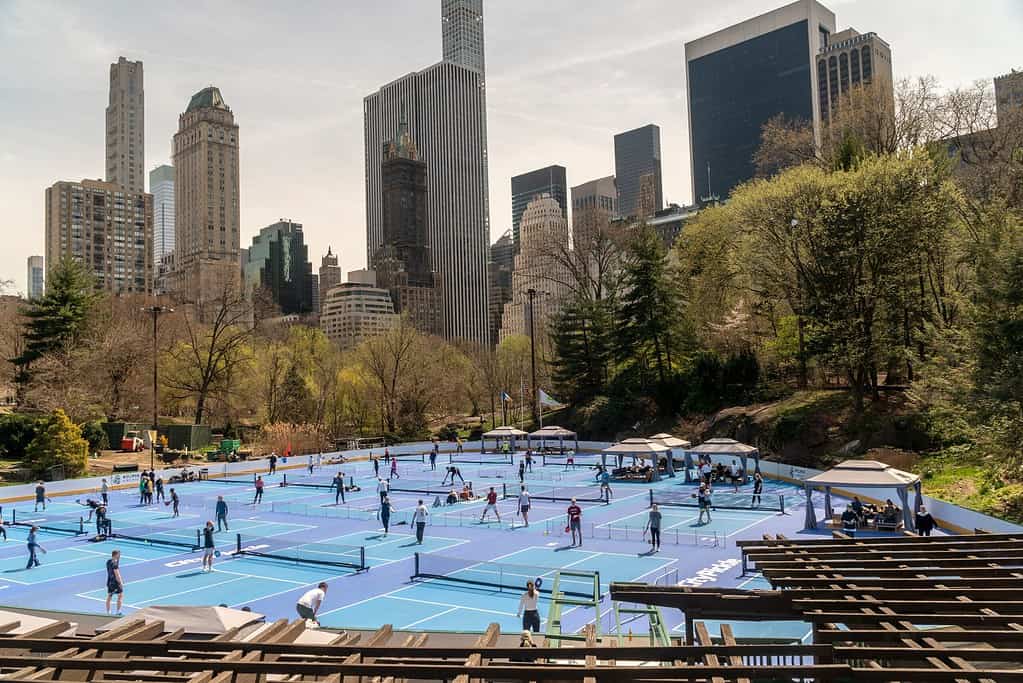
With pickleball’s growing popularity, court sharing and time management have become increasingly more important so everyone has a chance to play and have a good time. You should always keep track of how many points each team has scored as well as keep track of the time. When courts are busy, rotating off after one game and waiting for a court to open by placing your paddle in the paddle holder is a considerate practice.
Wearing proper attire and equipment is also key to an enjoyable game. Showing respect when playing on shared and crowded courts ensures a pleasant experience for all players involved.
Crossing and Entering the Court
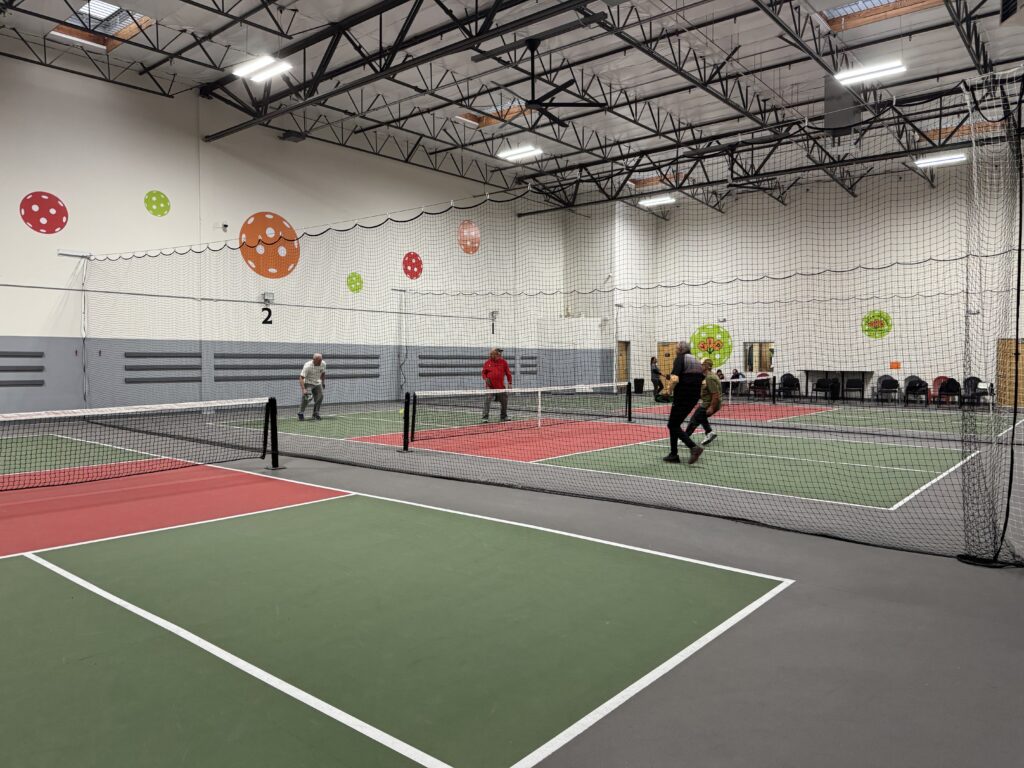
When crossing and entering the courts in pickleball, you should wait until the point is finished before seeking permission to cross.
Before heading across the court, you should wait for a pause in the action to minimize disruptions and maintain a safe playing environment. Making contact with the serving team is a good idea to make sure they know you want to cross.
By being mindful of these court crossing and entering guidelines, you’ll contribute to a smooth and enjoyable pickleball experience for all players.
Sportsmanship and Positive Attitude
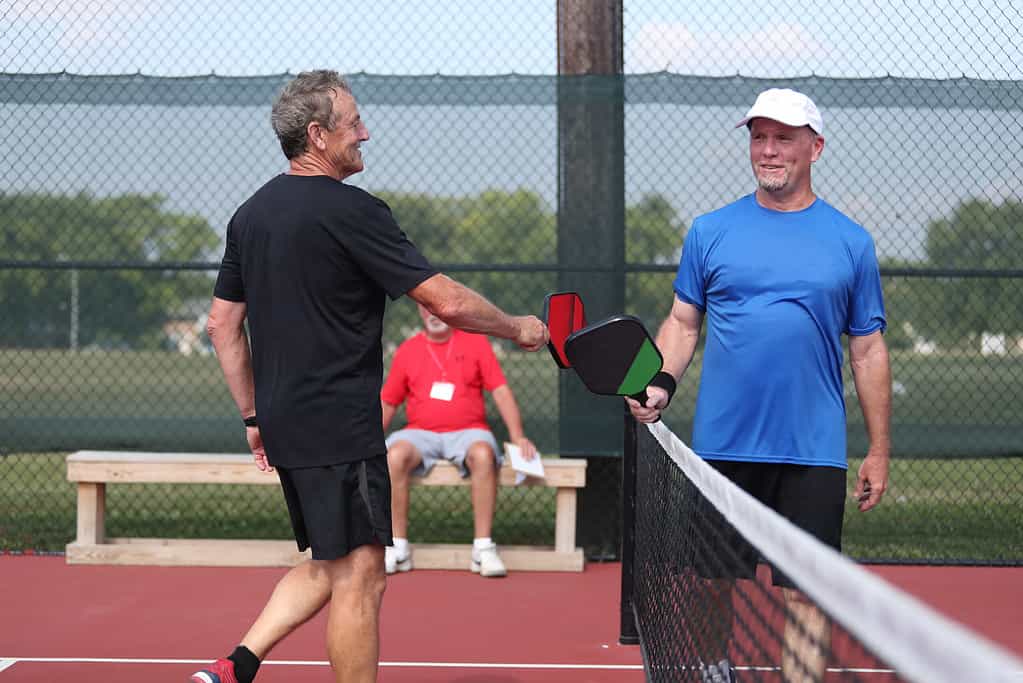
A Positive attitude and good sportsmanship are the foundation of pickleball! That’s what it’s all about! Having a competitive spirit while respecting opponents is also important for fostering a lively and welcoming atmosphere on the court. The key to good sportsmanship is being fair, generous, and mindful of each person’s physical limitations on the court.
Maintaining a positive attitude goes beyond just being a gracious winner or loser. It also involves staying energetic, consistent in your encouragement, and offering praise for your partner’s good plays while taking responsibility for your own mistakes.
By keeping a cool head and not letting emotions get the better of you, you’ll ensure that everyone has a positive and enjoyable experience while playing.
In the next few subsections, we’ll talk about the specifics of celebrating mindfully, owning mistakes and encouraging others, and balancing competitive spirit and respect.
Celebrating Mindfully
Celebrating your accomplishments and victories on the court is part of enjoying the game. However, we need to do so mindfully and respectfully. This means using fist pumps or paddle taps to show your excitement, avoiding over-the-top celebrations, and apologizing for lucky shots.
By adopting a mindful approach to celebrating, you’ll demonstrate respect for your opponents and contribute to a positive atmosphere on the court. A little sportsmanship goes a long way in creating a fun and fair experience for everyone involved.
Owning Mistakes and Encouraging Others
Owning up to your mistakes and encouraging others is another key component of maintaining a positive attitude on the pickleball court. Acknowledging your mistakes, avoiding negative body language and facial expressions, and praising your partner for their good play helps foster a supportive environment for all players.
It’s also essential to avoid being too intense when pointing out others’ faults. Instead, focus on giving credit to your partner for the good things they do and offering constructive feedback when necessary. This approach not only promotes a positive atmosphere on the court but also helps players grow and improve their skills.
Balancing Competitive Spirit and Respect
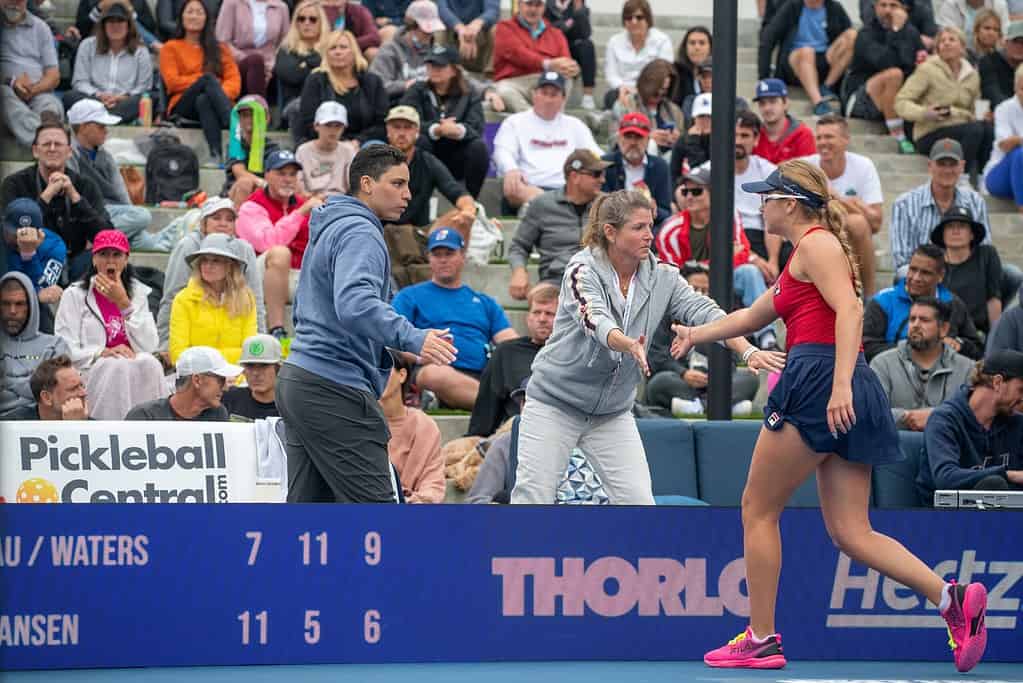
While having a competitive spirit is a part of enjoying pickleball, it’s equally important to balance it with respect for your opponents. This involves being aware of their emotions, avoiding offensive or hostile behaviors, and displaying good sportsmanship throughout the game. This balance not only ensures a fair and enjoyable experience for all players but also contributes to your personal growth as a pickleball player.
By embracing a respectful attitude and prioritizing fair play, you’ll be able to develop a well-rounded skillset and become a better competitor on the court.
Remember, pickleball is a sport meant to be enjoyed by all. Striking the right balance between competitive spirit and respect is key to creating a positive and welcoming atmosphere for everyone involved.
Continuous Improvement and Humility in Pickleball
As you progress in your pickleball journey, continuous improvement and humility become increasingly important. Staying humble, knowing the official rules, and embracing learning opportunities help you become a better player. Adapting to different play styles, skill levels, and strategies is key to creating a fun and fair experience for all participants.
Practicing regularly, learning new techniques, and seeking feedback from more experienced players are crucial for improving your skills. Simultaneously, staying humble and remembering that there’s always something new to learn will help you maintain a positive attitude and contribute to a supportive and enjoyable experience for all players.
Knowing the Official Rules
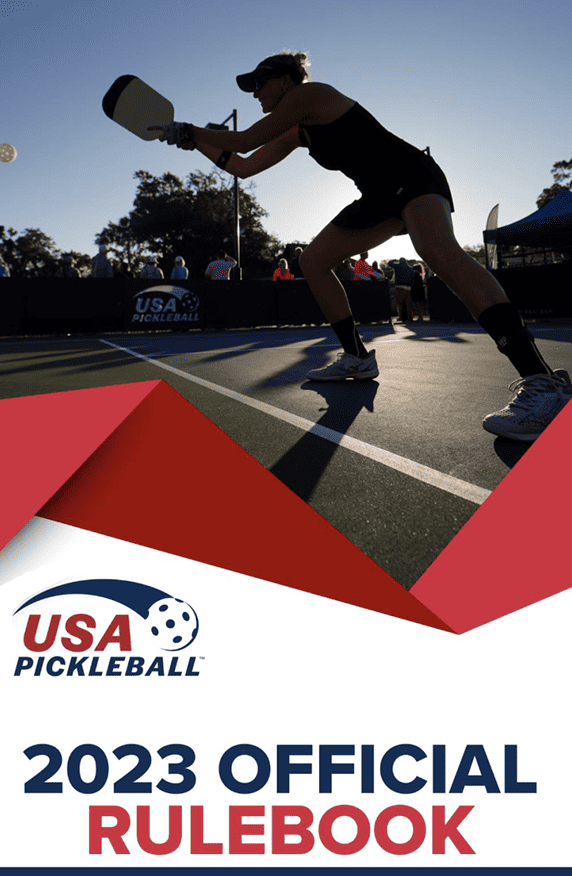
Understanding the official rules is crucial for improving your gameplay and avoiding mistakes. The Official Pickleball Rulebook, published by USA Pickleball, covers essential aspects such as the double bounce rule, the underhand serve, and the scoring system.
Being well-versed in the official rules not only enhances your performance but also demonstrates your commitment to fair play and respect for the game. This knowledge is invaluable in ensuring a smooth and enjoyable experience for everyone on the court.
Embracing Learning Opportunities
Every match and opponent in pickleball presents a unique opportunity for learning and growth. By staying open to playing with different skill levels and styles, you’ll continuously improve and develop your skills. This approach not only helps you become a better player but also contributes to a fun and fair experience for all participants.
Taking advantage of learning opportunities in pickleball can improve your hand-eye coordination, movement, strength, balance, and flexibility. It’s also beneficial for mental health, reducing stress, boosting self-esteem, and providing a chance to meet new people. Additionally, staying active through pickleball can improve heart health and even prevent osteoporosis.
To make the most of these learning opportunities, be open to different strategies and techniques, and don’t be afraid to ask questions if you’re not sure. Practicing and experimenting with different shots and strategies will help you discover what works best for you.
Adapting to Different Play Styles
Being able to adapt to different play styles, skill levels, and strategies is necessary for creating a fun and fair pickleball experience. Flexibility and openness to various techniques are key to ensuring an enjoyable game for all players. By taking the time to learn from your opponents and adjusting your gameplay accordingly, you’ll become a more well-rounded player.
Adjusting your game to cater to different skill levels and styles, including advanced players, not only demonstrates respect for your opponents but also helps you master a variety of shots and strategies. This adaptability is crucial in ensuring a pleasant experience for all participants, regardless of their skill level or background.
In conclusion, embracing continuous improvement, humility, and adaptability in pickleball is essential for both personal growth and fostering a positive, enjoyable atmosphere on the court. By staying open to learning and adapting to different play styles, you’ll contribute to a fun and fair experience for all players involved.
Summary
Throughout this guide, we’ve explored the importance of proper pickleball etiquette, from the unwritten rules and respectful ball handling to sportsmanship and continuous improvement. By embracing these principles and maintaining a positive attitude, you’ll contribute to a welcoming and enjoyable atmosphere on the court. Ultimately, the key to a successful pickleball experience lies in striking the right balance between competitive spirit and respect, ensuring a fun and fair game for all.
Frequently Asked Questions
What is proper etiquette in pickleball?
Always respect your opponent’s court, never ask or accept line calls from spectators, and play with all skill levels in mind. Show good sportsmanship by waiting your turn if you’re looking for a more competitive game.
How do you wait for a pickleball court?
If you’re waiting for a pickleball court, make sure to line up your paddle with the other paddles in the holder and when the game is done, all players should return to the bench.
What are some common unwritten rules in pickleball?
Respecting ball ownership, being mindful of stray balls, playing fair and inclusive, communicating properly on the court, and maintaining good sportsmanship are some of the common unwritten rules in pickleball.
How can I improve my pickleball skills?
To improve your pickleball skills, practice regularly, learn new techniques, seek feedback from experienced players, and be open to playing with different skill levels and styles.

